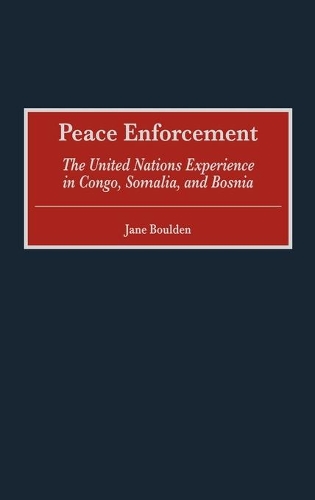
Peace Enforcement: The United Nations Experience in Congo, Somalia, and Bosnia
(Hardback)
Publishing Details
Peace Enforcement: The United Nations Experience in Congo, Somalia, and Bosnia
By (Author) Jane Boulden
Bloomsbury Publishing PLC
Praeger Publishers Inc
30th May 2001
United States
Classifications
Tertiary Education
Non Fiction
International institutions / intergovernmental organizations
Cultural studies
327.172
Physical Properties
Hardback
176
Width 156mm, Height 235mm
397g
Description
The United Nations is being called upon more and more to participate if situations that fall somewhere between peacekeeping and full-scale enforcement operations, such as those in Korea during the 1950s and the Persian Gulf in 1991. Such efforts have come to be termed as peace enforcement operations. Three case studies in which the United Nations used this type of force are examined: the early 1960s UN operation in the Congo (ONUC); the UN operations on Somalia (UNITAF and UNOSOM); and the mission in Bosnia (UNPROFOR). Until now, no single investigation had considered these three case studies from the viewpoint of determining the advantages and disadvantages involved in using peace enforcement as a way of dealing with international peace and security issues. After careful examination, Boulden argues that, while problematic, peace enforcement is a potentially viable tool for the United Nations. The implementation of peace enforcement operations does, however, present the United Nations with a number of complicated challenges. Three factors have the power to influence the outcome of such operations. Without an adequate mandate, and--most importantly--without sufficient resources, the likelihood of success is low. Further, the maintenance of impartiality in the implementation of the operation (as opposed to whether or not the mandate itself is impartial) is critical to the chances of a positive outcome. Over all, the Security Council needs to have a greater awareness about the potential difficulties inherent in peace enforcement mandates and, accordingly, to take greater care in designing and monitoring these operations.
Reviews
.,."nicely presents the principal issues at play in the ongoing debate over whether the United nations should embark on peace enforcement operations in the future in light of its past efforts."-International Journal
"No other similar text exists that focuses on use-of-force decisions, making the book an excellent reference source....[T]his book will be useful for policy makers and students."-International Relations
...nicely presents the principal issues at play in the ongoing debate over whether the United nations should embark on peace enforcement operations in the future in light of its past efforts.-International Journal
No other similar text exists that focuses on use-of-force decisions, making the book an excellent reference source....[T]his book will be useful for policy makers and students.-International Relations
Recommended for general readers, undergraduates, and researchers and faculty.-Choice
A welcome addition to the literature ...-Journal of Refugee Studies
A welcome addition to the literature ...Journal of Refugee Studies
"A welcome addition to the literature ..."-Journal of Refugee Studies
"Recommended for general readers, undergraduates, and researchers and faculty."-Choice
..."nicely presents the principal issues at play in the ongoing debate over whether the United nations should embark on peace enforcement operations in the future in light of its past efforts."-International Journal
Author Bio
JANE BOULDEN is a Research Fellow at the Centre for International Relations in the Department of Politics and International Relations at Oxford University./e From 1999-2000 she was an Adjunct Professor in the Department of Political Studies, Queen's University, and a Fellow at the Centre for International Relations and the Defence Management Studies Program, both at Queen's University. In addition, she is a 1999-2001 NATO Fellow.
